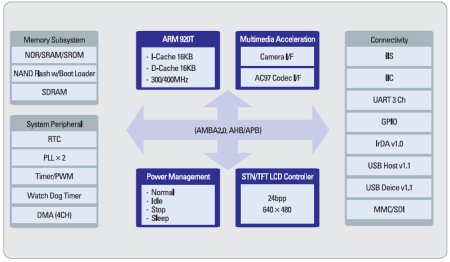User-modifiable Linux phone upgraded
Jan 3, 2008 — by Eric Brown — from the LinuxDevices Archive — 10 views Open source phone company OpenMoko will ship a new version of its user-modifiable Linux-based mobile phone next year. The “Neo FreeRunner” resembles OpenMoko's original Neo1973 model, but with WiFi, 3D accelerometers, and a faster processor, as well as a consumer market focus, according to the… company.
Open source phone company OpenMoko will ship a new version of its user-modifiable Linux-based mobile phone next year. The “Neo FreeRunner” resembles OpenMoko's original Neo1973 model, but with WiFi, 3D accelerometers, and a faster processor, as well as a consumer market focus, according to the… company.
(Click for larger view of FreeRunner mock-up)
digg this story |
The Neo FreeRunner's ability to run user-modified Linux kernels and application stacks means that it will likely be adopted as development hardware by Linux phone stack vendors such as Trolltech, which in September adopted OpenMoko's original Neo1973 model as an official development platform for its Qtopia Phone Edition software stack. However, unlike the Neo1973, the FreeRunner will eventually be produced in quantity, OpenMoko hopes, and marketed directly to consumers.
The Neo FreeRunner is based on a Samsung SoC (system-on-chip) called the S3C2442 (see block diagram below), clocked at 500MHz. The older Neo1973 featured a 266MHz Samsung S3C2410 processor.

Samsung S3C2442 block diagram
(Click to enlarge)
The FreeRunner will offer 256MB of Flash, up from 64MB in the Neo1973. Other upgrades will include 802.11b/g WiFi, two 3D accelerometers, and 2D/3D graphics acceleration via an SMedia's Glamo3662 mobile graphics chipset.
Like the Neo1973, the FreeRunner is a 2.5G tri-band GPRS/GSM phone. However, available models will support the 850MHz band, as well as the 900MHz band, for greater potential viability around the globe.
Additional Neo FreeRunner specs include:
- Processor — Samsung S3C2442 500MHz
- RAM — 128MB
- Flash — 256MB
- Display — 4.3-inch diagonal 640 x 480 VGA Color TFT LCD
- Graphics — SMedia 3362-based 3D graphics acceleration
- Accelerometers — 2 x 3D accelerometers
- Audio — “high-quality” audio codec
- USB — 1 x version 1.1
- Cellular — 2.5G tri-band GPRS/GSM (900MHz or 850MHz)
- WiFi — 802.11b/g WiFi
- Bluetooth — version 2.0
- GPS — AGPS (assisted global positioning system) receiver
On the software side, the Neo FreeRunner will use the same open source mobile phone software stack maintained by the OpenMoko project. One new addition appears to be the open source Jalimo JVM (Java virtual machine), which is maintained by German software development company Tarent GmbH.
The Neo FreeRunner is set to be demonstrated at next week's CES show, and manufactured for a spring “developer's” release by OpenMoko's former parent, Taiwanese consumer electronics giant First International Computer (FIC). A mass-market release will follow later in the year, OpenMoko hopes. The consumer version will be just as hackable as the current Neo1973, said new VP of marketing Steven Mosher in an interview.
“The Neo FreeRunner has some hardware changes we thought consumers would like, but the design will remain completely open,” said Mosher. “When someone wants to modify it and make it better, we always say 'yes' as long as they provide other people the same openness that we provide them.”
Additionally, OpenMoko announced it has completed its spin-out from FIC, announced in June. As an independent company, OpenMoko has hired several executives, including Mosher, a former Creative Labs executive. Other new hires include VP of Engineering Wolfgang Spraul, formerly with DataViz, and Lead Graphics Architect Carsten “The Rasterman” Haitzler, creator of Enlightenment and other open source projects.
Availability
The Neo FreeRunner is expected to ship in the spring, says OpenMoko. The Neo1973 is available at the OpenMoko site for $300. A full developer's kit that adds a JTAG/serial board, development cables, and a second MicroSD slot costs $400. Further information on the Neo FreeRunner development process can be found at the OpenMoko open source development site.
This article was originally published on LinuxDevices.com and has been donated to the open source community by QuinStreet Inc. Please visit LinuxToday.com for up-to-date news and articles about Linux and open source.